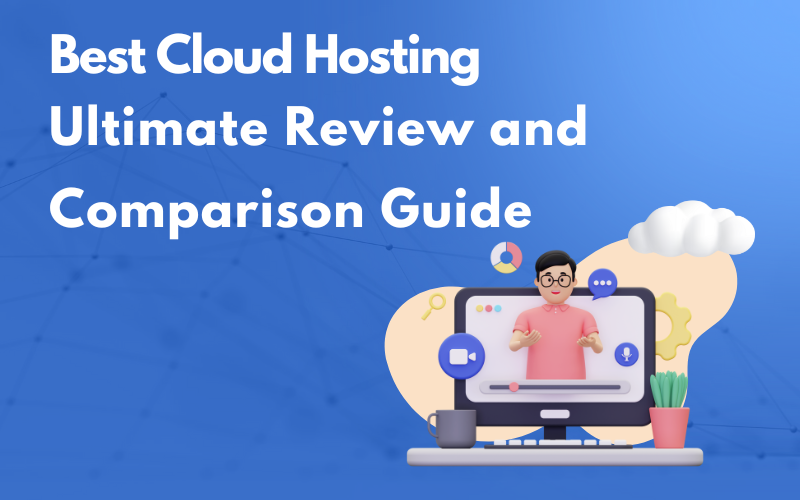Introduction of Best Cloud Hosting
In the rapidly evolving digital world, businesses and developers require hosting solutions that are scalable, reliable, and performance-driven. Cloud hosting has emerged as the premier choice for websites and applications needing flexible resource allocation, high availability, and robust infrastructure. Unlike traditional hosting, cloud hosting uses a network of interconnected virtual servers to deliver computing power and storage, enabling websites to handle traffic surges seamlessly and ensuring minimal downtime.
Looking for the best cloud hosting? Compare the leading providers based on performance, reliability, features, and pricing. Discover which cloud hosting service is right for your website, app, or growing business.
Cloud hosting providers offer a variety of plans ranging from simple virtual machines for small projects to complex, fully managed enterprise environments. Choosing the right cloud hosting provider depends on factors such as pricing, scalability, global data center availability, performance, security, and ease of use. In this article, we review seven of the best cloud hosting providers in detail to help you find the perfect fit for your needs.

Amazon Web Services (AWS) Cloud Hosting
Amazon Web Services, commonly known as AWS, is the undisputed leader in the cloud hosting industry. Launched in 2006, AWS pioneered many cloud technologies and today offers an extensive portfolio of services, including compute, storage, networking, machine learning, analytics, and more. It caters to startups, enterprises, governments, and individual developers alike.
Features and Specifications
AWS provides an incredibly diverse range of cloud solutions, from Elastic Compute Cloud (EC2) instances that power your servers to managed databases, content delivery through CloudFront, and serverless computing with Lambda. Users can choose from dozens of instance types optimized for various workloads, including compute-intensive, memory-optimized, or GPU-powered instances.
AWS supports autoscaling, allowing your infrastructure to grow or shrink automatically based on demand. Security is a top priority, with extensive compliance certifications, encryption, and network firewalls. The global network of data centers spans multiple regions and availability zones, ensuring redundancy and low latency worldwide.
Pricing and Plans
AWS follows a pay-as-you-go model, charging based on actual usage of compute hours, storage, and bandwidth. This flexibility allows startups to start small and scale without upfront costs. However, the pricing model can be complex and overwhelming for beginners. Reserved instances and Savings Plans offer discounts for committed usage over 1-3 years.
Pros
AWS’s unmatched breadth of services and global infrastructure provide enterprise-grade scalability and flexibility. It is ideal for complex applications needing advanced cloud architecture and integrations.
Cons
The pricing structure is complicated, and the learning curve is steep. Managing AWS services requires significant technical expertise.
Who Is It For?
AWS is perfect for large enterprises, startups aiming for rapid growth, developers building complex applications, and organizations requiring global reach and compliance.
Why Choose AWS?
Choosing AWS means tapping into the most mature and widely adopted cloud platform with a vast ecosystem, extensive documentation, and continuous innovation.
Final Thought
AWS remains the gold standard for cloud hosting but may be overwhelming for beginners or simple website hosting needs.

Google Cloud Platform (GCP)
Google Cloud Platform is Google’s answer to cloud hosting, offering high-performance infrastructure and cutting-edge AI and data analytics tools. With a strong emphasis on machine learning and big data, GCP is a favorite among developers focused on innovation.
Features and Specifications
GCP offers Compute Engine virtual machines, Kubernetes Engine for container orchestration, and BigQuery for data warehousing. Its network infrastructure leverages Google’s private fiber optic network, delivering low latency and high throughput. GCP also provides integrated AI services like Vision AI and Natural Language API.
Security features include identity and access management, data encryption at rest and in transit, and compliance with global standards. GCP’s multi-region availability ensures disaster recovery and geographic redundancy.
Pricing and Plans
GCP pricing is usage-based with sustained use discounts automatically applied, making it easier to predict monthly costs. Google also offers a free tier with limited resources, ideal for testing and development.
Pros
GCP’s strong networking backbone, user-friendly pricing, and focus on AI/ML tools make it a powerful platform for tech-forward businesses.
Cons
Compared to AWS, GCP has a smaller market share and fewer third-party integrations.
Who Is It For?
Businesses leveraging data analytics, AI, and machine learning will find GCP particularly valuable. It’s also suitable for startups and developers wanting competitive pricing and performance.
Why Choose Google Cloud?
Google Cloud offers innovation and simplicity with a robust infrastructure backed by Google’s global network.
Final Thought
GCP is a strong contender in cloud hosting, especially for projects requiring AI integration and scalable analytics.

DigitalOcean Cloud Hosting
DigitalOcean has carved out a strong reputation as a developer-friendly cloud hosting provider with a focus on simplicity, speed, and transparent pricing. Since its launch in 2011, it has become popular among startups, freelancers, and small businesses looking for affordable yet scalable cloud infrastructure.
Features and Specifications
DigitalOcean offers Droplets (virtual private servers) that can be quickly deployed with pre-configured OS images including Ubuntu, CentOS, and Debian. It supports managed Kubernetes clusters, scalable databases, object storage, and block storage. Its platform emphasizes ease of use with a clean, intuitive control panel and a powerful API for automation.
The company also provides a global network of data centers covering North America, Europe, and Asia-Pacific, allowing users to deploy applications closer to their customers. DigitalOcean includes built-in monitoring, automatic backups, and floating IPs for high availability.
Pricing and Plans
DigitalOcean follows a straightforward monthly and hourly billing system. Plans start as low as $4 per month for basic droplets and scale to larger instances with more CPU, RAM, and storage. The pricing is transparent and predictable, appealing especially to budget-conscious developers.
Pros
DigitalOcean is exceptionally easy to use, with great documentation and community support. Its predictable pricing and developer tools simplify cloud hosting for small and medium projects.
Cons
DigitalOcean lacks some advanced features and managed services that larger providers offer, which may limit enterprise use cases.
Who Is It For?
This provider suits developers, startups, and small businesses wanting simple, cost-effective cloud hosting with easy scalability and minimal complexity.
Why Choose DigitalOcean?
DigitalOcean strikes a balance between power and simplicity, making cloud hosting accessible without sacrificing performance.
Final Thought
For developers and small businesses seeking straightforward, affordable cloud hosting with rapid deployment, DigitalOcean is an excellent choice.
Vultr Cloud Hosting
Vultr is a popular cloud hosting provider known for its global reach, diverse instance options, and competitive pricing. Since its founding in 2014, Vultr has focused on delivering high-performance cloud infrastructure that is easy to deploy and scale.
Features and Specifications
Vultr provides cloud compute instances with SSD storage, from basic virtual machines to high-frequency compute optimized for CPU-intensive tasks. It offers one-click app deployment, block storage, DDoS protection, and a simple but effective control panel.
The network spans over 20 worldwide locations, providing low latency and localized hosting options. Vultr supports both Linux and Windows servers and offers custom ISO uploads for specialized deployments.
Pricing and Plans
Vultr’s pricing starts at $5 per month with hourly billing options. It has multiple tiers including regular instances, high-frequency CPUs, and dedicated cloud servers. This allows users to choose according to workload requirements and budget.
Pros
Vultr’s wide geographic coverage and flexible instance types provide excellent performance and customization options. Its pricing is transparent and affordable for most users.
Cons
Customer support is primarily ticket-based with no phone support, which can delay response times during critical issues.
Who Is It For?
Vultr is well-suited for businesses and developers needing global presence, diverse server options, and cost-effective cloud hosting.
Why Choose Vultr?
With its global data centers, versatile plans, and competitive pricing, Vultr is a strong contender for flexible cloud hosting solutions.
Final Thought
Vultr combines affordability, performance, and geographic flexibility, making it ideal for projects requiring global reach without breaking the bank.
Linode Cloud Hosting
Linode is one of the earliest independent cloud hosting providers, established in 2003, with a solid reputation for reliable and affordable cloud infrastructure. It appeals to developers and businesses who want straightforward VPS-style cloud hosting with high performance.
Features and Specifications
Linode offers virtual private servers with SSD storage, supporting a range of operating systems including various Linux distributions and Windows. It provides managed Kubernetes clusters, object storage, block storage, and networking features such as private IPs and DDoS protection. Linode’s data centers are spread across North America, Europe, and Asia-Pacific, enabling low latency worldwide.
The platform includes an intuitive control panel, API access, and developer tools to automate deployments and management. Linode also emphasizes security with regular updates, two-factor authentication, and comprehensive backups.
Pricing and Plans
Linode’s pricing is simple and competitive, starting at $5 per month for a basic VPS with 1 GB RAM, 1 CPU core, 25 GB SSD storage, and 1 TB transfer. Plans scale up for more resources and include hourly and monthly billing options. Additional services such as backups and managed support are available as add-ons.
Pros
Linode offers a reliable and developer-friendly cloud environment with transparent pricing and strong community support. Its straightforward setup makes it easy to get started quickly.
Cons
Linode lacks some of the advanced managed services and enterprise features offered by larger cloud providers.
Who Is It For?
Linode is ideal for developers, startups, and SMBs looking for affordable, high-performance cloud servers without the complexity of enterprise cloud platforms.
Why Choose Linode?
Linode delivers reliable, cost-effective cloud hosting with excellent developer tools and a supportive user community.
Final Thought
For those seeking an easy-to-use, reliable VPS-style cloud hosting platform with transparent pricing, Linode is a dependable choice.
Microsoft Azure Cloud Hosting
Microsoft Azure is a leading enterprise cloud provider offering a vast array of services and global infrastructure. Azure integrates tightly with Microsoft products and services, making it popular among enterprises and organizations invested in the Microsoft ecosystem.
Features and Specifications
Azure provides virtual machines, managed Kubernetes, serverless computing, AI and analytics services, and extensive database options. Its global network of data centers spans over 60 regions worldwide, providing extensive reach and redundancy.
Azure offers hybrid cloud solutions allowing businesses to connect on-premises infrastructure with the cloud. Security is robust, with advanced identity management, threat protection, and compliance certifications. Azure also provides developer tools and integration with Visual Studio for streamlined application deployment.
Pricing and Plans
Azure uses a pay-as-you-go pricing model with various reserved instance discounts. It offers many tiers and services, which can complicate cost estimation for beginners. Enterprise agreements and volume discounts are available for large customers.
Pros
Azure’s integration with Microsoft products and extensive service portfolio make it a preferred choice for enterprises and hybrid cloud deployments.
Cons
Pricing complexity and a steep learning curve can be challenging for smaller organizations or new users.
Who Is It For?
Azure is best for enterprises, large organizations, and businesses heavily using Microsoft technologies needing a global, compliant, and integrated cloud platform.
Why Choose Azure?
Azure delivers enterprise-grade cloud services with a strong focus on hybrid deployments, compliance, and Microsoft ecosystem integration.
Final Thought
For organizations requiring a powerful and versatile cloud platform closely tied to Microsoft technologies, Azure remains a top choice.
Cloudways Managed Cloud Hosting
Cloudways offers a managed cloud hosting platform that simplifies deploying and managing cloud servers from top providers like AWS, Google Cloud, DigitalOcean, Vultr, and Linode. It is designed to provide the power of cloud hosting with easy management and optimized performance.
Features and Specifications
Cloudways abstracts the complexity of cloud hosting by providing a user-friendly control panel that manages server setup, application deployment, backups, and security. It supports PHP-based applications like WordPress, Magento, and Laravel with optimized server configurations and built-in caching layers such as Varnish, Memcached, and Redis.
Users can choose their preferred cloud infrastructure provider, location, and server size, with auto-scaling available on certain plans. The platform includes free SSL certificates, automated backups, 24/7 monitoring, and proactive security patches. Additionally, Cloudways offers staging environments and team collaboration tools.
Pricing and Plans
Pricing varies depending on the chosen cloud provider and server size. Cloudways charges a monthly fee on top of the underlying cloud provider’s costs, making it more expensive than direct cloud hosting but worth it for managed services. Plans start around $10/month with scalability options.
Pros
Cloudways removes the technical barriers to cloud hosting by offering managed services, excellent customer support, and performance optimizations tailored for popular web apps.
Cons
Higher cost compared to unmanaged cloud hosting and some limits on customization due to managed environment constraints.
Who Is It For?
Cloudways suits website owners, agencies, and businesses who want cloud hosting power without the technical hassle of server management.
Why Choose Cloudways?
Cloudways combines cloud infrastructure flexibility with managed ease of use and developer-friendly features.
Final Thought
For users seeking simplified cloud hosting management with performance and security optimizations, Cloudways offers a compelling managed solution.
Looking for Best WORDPRESS HOSTING VISIT US
Conclusion
Cloud hosting has transformed how businesses and developers deploy, scale, and manage web applications. The seven providers reviewed here represent the best options available today, each with unique strengths catering to different needs and technical expertise levels.
Amazon Web Services and Microsoft Azure dominate the enterprise and complex application space with unparalleled service breadth and global reach but come with complexity and pricing challenges. Google Cloud shines with its networking backbone and AI tools, appealing to data-driven projects.
DigitalOcean, Vultr, and Linode offer affordable, developer-friendly cloud servers ideal for startups and SMBs who want straightforward, reliable infrastructure. Finally, Cloudways stands out by simplifying cloud management with a managed platform layered on top of top cloud providers, making cloud hosting accessible without deep technical knowledge.
Choosing the right cloud hosting depends on your project size, budget, technical skills, and specific requirements such as performance, compliance, and global reach. This guide aims to provide you with the insights needed to make an informed decision that matches your goals and ensures scalable, secure, and cost-effective cloud hosting.
Frequently Asked Questions (FAQs)
What is cloud hosting, and how does it differ from traditional hosting?
Cloud hosting uses a network of virtual servers hosted on a cloud infrastructure rather than a single physical server. This allows for flexible resource allocation, scalability, redundancy, and higher uptime compared to traditional shared or dedicated hosting where resources are fixed and tied to one machine.
Is cloud hosting suitable for small websites or blogs?
Yes, many cloud providers offer affordable entry-level plans ideal for small websites and blogs. Cloud hosting provides better scalability and performance, so even small sites benefit from faster loading times and the ability to handle traffic spikes.
Which cloud hosting provider is best for beginners?
Providers like DigitalOcean and Cloudways are generally more beginner-friendly. DigitalOcean offers simple droplets with great documentation, while Cloudways manages the technical side of cloud hosting, allowing users to focus on their websites.
How does pricing work in cloud hosting?
Most cloud providers use pay-as-you-go pricing based on actual resource usage (CPU, RAM, storage, bandwidth). While this provides flexibility, costs can fluctuate. Providers often offer reserved or committed plans with discounts for long-term use.
Can I scale my cloud hosting resources as my website grows?
Absolutely. One of cloud hosting’s key advantages is scalability. You can increase CPU, memory, storage, or bandwidth quickly, sometimes automatically through autoscaling features, to handle increased traffic or workload.
Is cloud hosting secure?
Cloud providers implement strong security measures including encryption, firewalls, DDoS protection, and compliance with international standards. However, security also depends on how you configure and maintain your servers and applications.
Do cloud hosting providers offer backups?
Most providers offer automated backups either included or as an add-on service. It’s essential to configure regular backups and test restores to protect against data loss.
What support options are available with cloud hosting?
Support varies widely. Enterprise providers like AWS and Azure offer comprehensive support plans at additional costs. Simpler providers like DigitalOcean offer community and ticket support. Managed providers like Cloudways include 24/7 live support as part of their service.
Can I migrate my existing website to cloud hosting?
Yes, many cloud providers and managed services offer migration assistance or tools to transfer your existing website or applications. It’s advisable to plan migrations carefully to avoid downtime.
Are there any drawbacks to cloud hosting?
Potential drawbacks include pricing complexity, especially with enterprise providers, and a steeper learning curve for managing cloud infrastructure compared to traditional shared hosting. Managed services can mitigate these issues at a higher cost.

